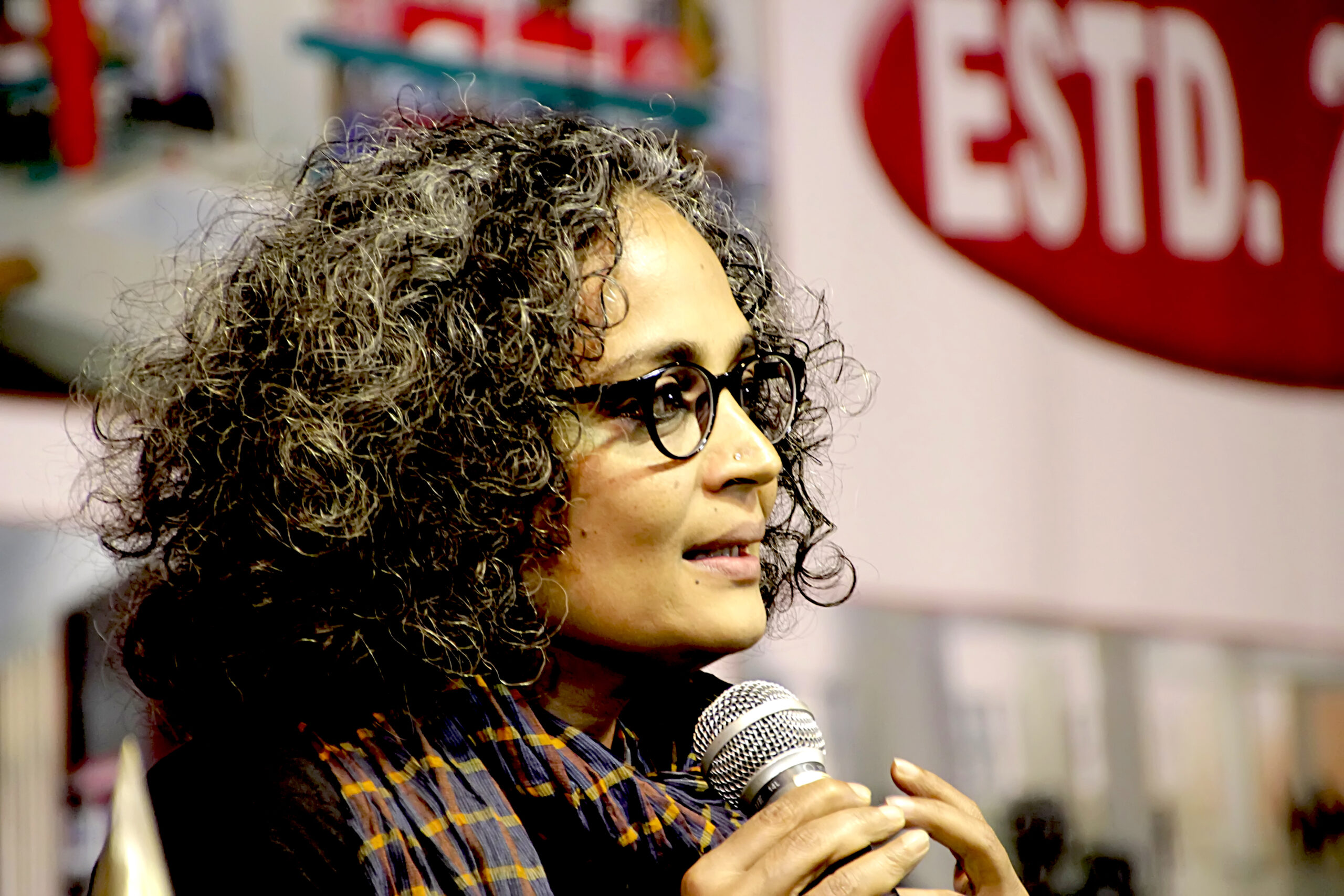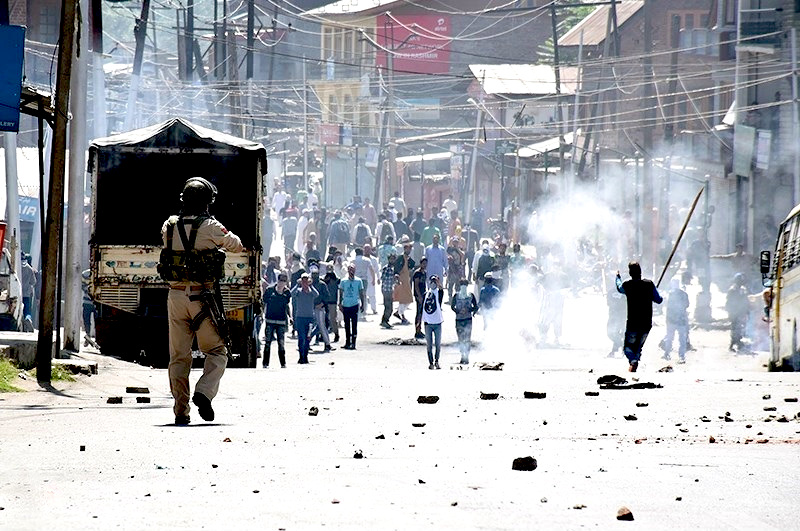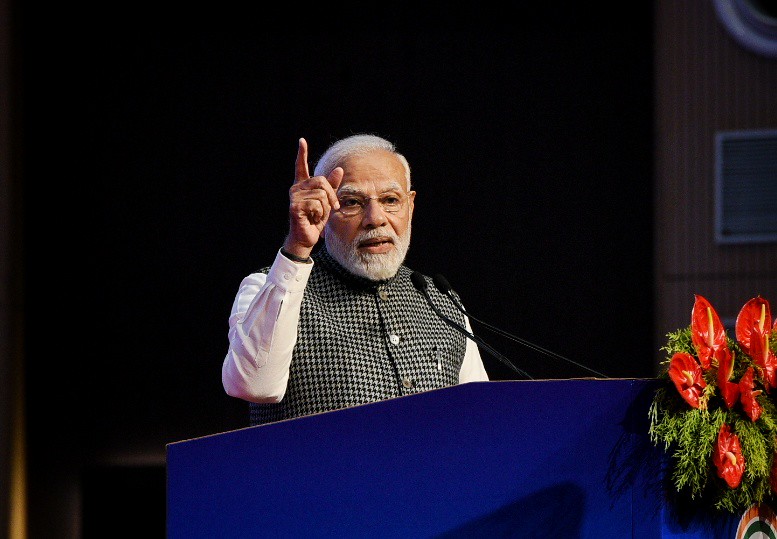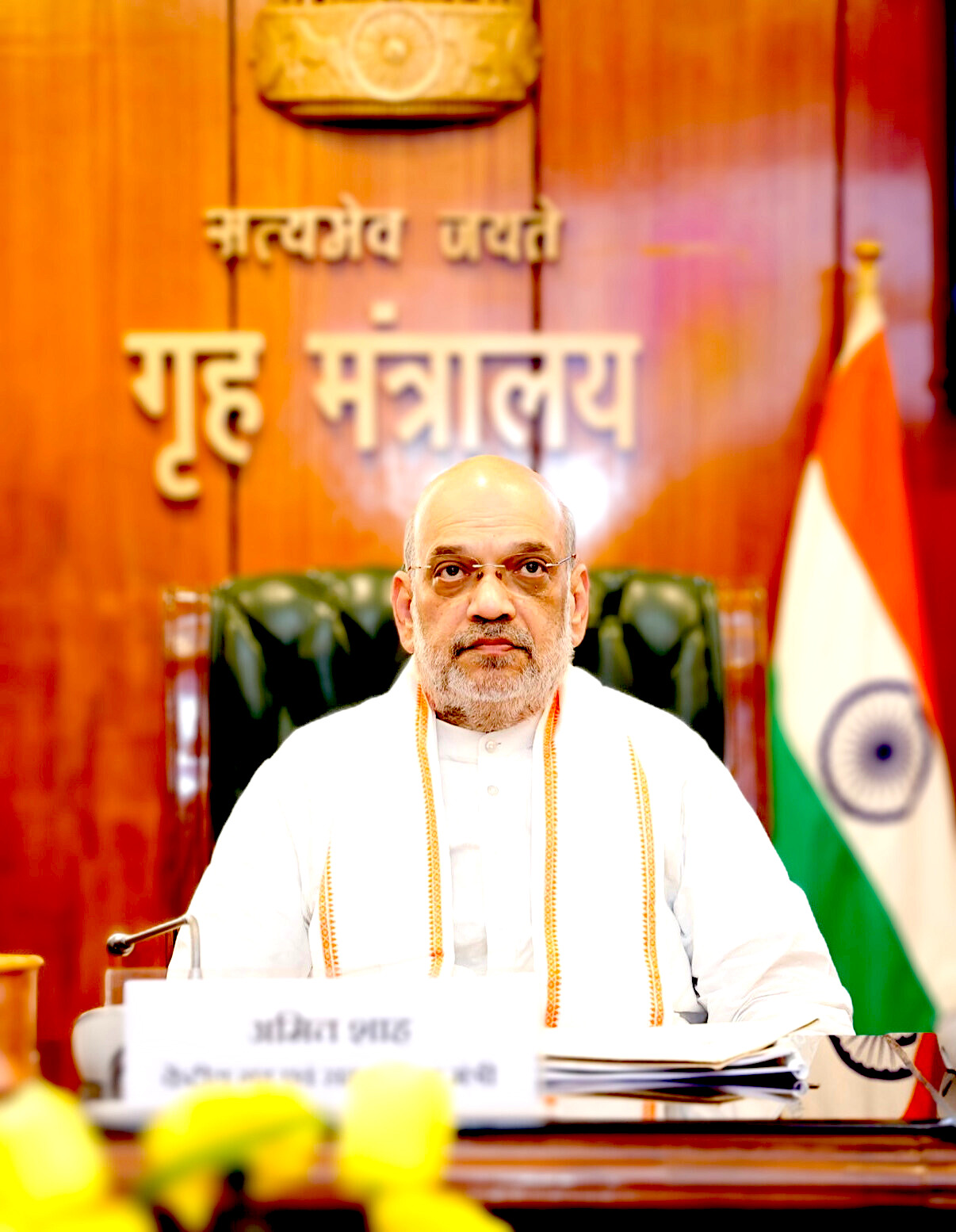The Modi government plans to try the globally renowned author under a draconian anti-terrorism law, reports Ullekh NP.

Arundhati Roy in 2012. (Vikramjit Kakati, Wikimedia Commons, CC BY-SA 3.0)
By Ullekh NP
Special to Consortium News
 The move by India to prosecute its internationally acclaimed Booker Prize-winning writer Arundhati Roy under an anti-terrorism law over her remarks made 14 years ago on the country’s trouble-torn Kashmir region has raised serious questions about Indian democracy.
The move by India to prosecute its internationally acclaimed Booker Prize-winning writer Arundhati Roy under an anti-terrorism law over her remarks made 14 years ago on the country’s trouble-torn Kashmir region has raised serious questions about Indian democracy.
A section of local pundits sees this decision as a reckless message by the Modi government that the reverses it suffered in the recent general election don’t mean it will abandon its hardline nationalism.
The ruling, pro-Hindutva Bharatiya Janata Party (BJP) failed to get an expected absolute majority in the 2024 general election, making it dependent on regional partners in a rainbow coalition. The wider expectation was that the BJP would now go slow on its Hindu-first policies and soften its stance against dissidents. The poll results, which trailed forecasts, rattled Prime Minister Narendra Modi.
Delhi state’s Lieutenant Governor VK Saxena gave the police sanction to prosecute Roy and former Central University of Kashmir professor Sheikh Showkat Hussain under the Unlawful Activities (Prevention) Act, or (UAPA), on June 14.
UAPA had been in force since 1967 as an anti-terrorism law, but in August 2019, the Modi government made it more stringent, amending it to “include the provision of designating an individual as a terrorist.” Before that, only organizations could be designated as a terrorist organization.
Several opposition parties have attacked the amendment saying the new law lacks provisions to check misuse. The legislation has also come under criticism for its low conviction rate.
It has been challenged by various people in the Supreme Court, the country’s top court. Article 19 of the Indian Constitution provides a right “to freedom of speech and expression.”
However, in February this year, individuals and groups that had challenged the constitutional validity of its provisions withdrew their pleas.
Delhi’s lieutenant governor’s office said in a statement:
“Roy and Hussain had allegedly made provocative speeches at a conference organised under the banner of ‘Azadi – The Only Way’ on 21.10.2010 at LTG Auditorium, Copernicus Marg, New Delhi. The issues discussed and spoken about at the conference propagated the ‘separation of Kashmir from India.’”
Interestingly, the first information report (FIR), a document prepared by the police based on information they have as soon as they learn of any cognizable offence, was registered on Nov. 27, 2010, at New Delhi’s Tilak Marg Police Station.
Charged for 2010 Comments on Kashmir

Indian police in Kashmir Valley confronting protesters in December 2018. (Tasnim News Agency, Wikimedia Commons, CC BY 4.0)
It was drafted under orders of the Court of Metropolitan Magistrate, New Delhi, based on a complaint by a social activist named Sushil Pandit who charged Roy and Hussain with making provocative speeches at a seminar held on Oct. 21, 2010.
An Oct. 25, 2010 report by India’s premier news agency, Press Trust of India, said that Roy had stated in the seminar that Kashmir had never been an integral part of India. “It is a historical fact. Even the Indian Government has accepted this,” she was quoted as saying in the report.
Neither Roy nor her attorney responded to a request for comment.
The government’s action against Roy, 62, has been condemned by Indian civil society activists, opposition parties, writers, peace experts and lawyers.
Sumantra Bose, political scientist and author of Kashmir at the Crossroads: Inside a 21st-Century Conflict (2021) has hit out at the federal government. “This shows yet again how endangered the right to freedom of speech is in India today,” he told Consortium News.
The Modi government’s 2019 revocation of Jammu and Kashmir’s special autonomous status and separate constitution (upheld by the Supreme Court in 2023) sparked a crisis in the region, about which Bose said:
“Almost five years after the second Narendra Modi government railroaded the Jammu and Kashmir Reorganisation Act through Parliament in August 2019, it is difficult to find more than a smattering of individuals in the liquidated and dismembered state who are happy with the regime inflicted on them.”

Modi giving an address in Indore, January 2023. (MEA, India, Flickr, CC BY-NC-ND 2.0)
He added that, most remarkably, those unhappy include the Buddhists of eastern Ladakh and large sections of Jammu Hindus. “The post-August 2019 regime has institutionalized repression and fear, especially in the Kashmir Valley, and deprived all the people and communities of the erstwhile state of any semblance of representative institutions and accountable government,” he said.
Bose, a professor at the London School of Economics, said the post-August 2019 regime in the Union Territories of Jammu & Kashmir and Ladakh engineered by Modi and his “chief henchman-cum-enforcer” Amit Shah, minister of home affairs, is run by bureaucrats sent by New Delhi. “Its extreme securitization of the Kashmir conflict represents authoritarianism at its worst,” he said.

Amit Shah chairing a meeting in New Delhi on Monday. (Ministry of Home Affairs,
Wikimedia Commons, GODL, CC BY 4.0)
For her part, Radha Kumar, who had served as an interlocutor appointed by the government for Jammu and Kashmir from 2010 to 2011 and has worked in various parts of the world to bring peace to troubled areas, told Consortium News that using the UAPA law against anyone for a speech or even many speeches is a gross violation of freedom of expression, unless there is proof the speech led to actual violence.
An alumnus of the University of Cambridge, Kumar, whose specialisations include ethnic conflicts, peace studies and conflict resolution, said:
“Sanction given more than a decade after the speech is dubious, to say the least. Given that there are BJP MPs who have made speeches inciting violence but have not been prosecuted, the bias is evident and very serious.”
Roy, who shot to global fame in 1997 following the publication of her debut novel, The God of Small Things, which won the Booker Prize for Fiction, has been a relentless social and political activist since then, courting controversies and earning the wrath of right-wing politicians.
Vocal Critic of Modi & Hindu-First Policies
She has also been vocal in her criticism of Modi, his friends in the corporate world, and the Hindu-first policies pursued by the Modi dispensation. She has penned several widely read essays over the past three decades criticizing the establishment and policies on Kashmir, environmental issues and right-wing politics.
Lawyers in India, too, are piqued at this decision.
Avani Bansal said she sees a clear political bias in the sanction given by Delhi’s lieutenant governor to prosecute Roy. Bansal, a lawyer practising in the Supreme Court of India, argued:
“First, it remains unexplained why the prosecution is taking place after 14 years of the speech made by her. Secondly, the Delhi Police had done some necessary investigations in this case after the speech and found no basis for any legal action. Thirdly, there is a series of judgements by the Indian Supreme Court that lays down that mere dissent or difference of opinion with that of the central government cannot be a ground to suggest ‘sedition’ (Rajat Sharma vs. The Union of India Case, 2021).
Finally, for a legally valid prosecution, under Section 124A, 153A, 153B and 505(2) of the IPC (Indian Penal Code), it is necessary to show that the words written or spoken, or signs or visible representation, have the tendency or intention of creating public disorder or disturbance of public peace by incitement to offence (Kedar Nath Singh vs. State of Bihar, 1962).”
Bansal affirmed that Roy’s speech at a seminar in 2010 did not have any such effect as stated above. That Roy showcased her views on Kashmir to create public disorder is an extreme exaggeration at best, Bansal told Consortium News.
“The Indian government under Modi should not crush its dreamers. Doing so will be the death of democracy itself,” said Bansal, an alumnus of Harvard and Oxford universities. “Writers are dreamers who, through their words and thoughts, show us visions of all kinds. This is what keeps our constitutional spirit alive.”
This year, Modi and his team fought the elections on the back of Hindu majoritarianism and national populism and expected a landslide win, a mandate that would have made it powerful enough to rewrite the Constitution of India and put India on the path of absolute rule.
That didn’t happen. And now this has.
Ullekh N.P. is a writer, journalist, and political commentator based in New Delhi. He is the executive editor of the newsweekly Open and author of three nonfiction books: War Room: The People, Tactics and Technology Behind Narendra Modi’s 2014 Win, The Untold Vajpayee: Politician and Paradox and Kannur: Inside India’s Bloodiest Revenge Politics. His forthcoming book on Cuba, part travelogue and part political commentary, is due for release in November 2024.
Views expressed in this article and may or may not reflect those of Consortium News.
Please Donate to the
Spring Fund Drive!



To be fair to Modi, Arundhati Roy was threatened with arrest by India’s Congress Party over her article on the ‘Unmarked Mass Graves of Kashmir” even before the BJP came to power. Roy was right that Kashmir had never been part of India – the late Jawaharlal Nehru had promised to honor a referendum by the Kashmiris on this issue but never did execute that promise (probably because he knew many in his own party would reject the idea of allowing the Kashmiris the right to vote for independence).
hxxps://amp.theguardian.com/world/2012/jul/09/mass-graves-of-kashmir
Readying Arundhati Roy’s September 14, 2023 essay titled “The dismantling of democracy in India will affect the whole world,” leaves no doubt as why Modi’s India is prosecuting her. The essay is a shocking account of Indai’s decent into fascism. She says:
“They have mapped, step by step, India’s descent into first majoritarianism and then full-blown fascism. Yes… , the ruling Bhartiya Janata Party’s message of Hindu supremacism has relentlessly been disseminated to a population of 1.4 billion people…—the most dangerous time for India’s minorities, Muslims and Christians in particular.
It is no longer just our leaders we must fear, but a whole section of the population. The banality of evil, the normalisation of evil is now manifest in our streets, in our classrooms, in very many public spaces… India’s Constitution has been effectively set aside. The Indian Penal Code is being rewritten.”
Ms Roy has always been a fearless voice for democracy and social justice.
As such the oppressive fascists must fabricate a bogus excuse to muzzle her.
Will ordinary people passively accept this relentless slide into dystopian tyranny? Or is it time to rise up and speak up?
War is peace
Freedom is slavery
Ignorance is strength
People with small minds and big egos have a talent for inserting themselves into positions of power. They also have shown they lack empathy for those not like them. We are seeing the results of this in so many governments today. How do we who see the danger to human rights by these bigots bring about a system that makes it very difficult for these types of personalities to ascend to powerful positions where they have so many opportunities to create havoc and misery?
Boy, all of these “so called” governments want to squelch the voices from the masses! Hopefully they won’t succeed any further than they already have…
Arundhati Roy’s voice is so eloquent and should never be silenced…
Susan I agree. as you stated beautifully.
It’s frightening, too, because censorship also is spreading across all the Western “democracies” like wildfire….the US, Britain, France, Canada, Australia, et. al and Irael has been that way for 76 years.
Ms. Roy, like other writers, doesn’t deserve this ignominious attack. But, then, look where Julian Assange sits.